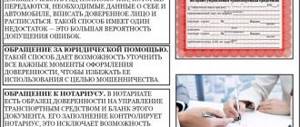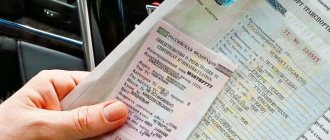What is a general power of attorney?
A general power of attorney is an official document (necessarily certified by a notary), which allows one person (trustee) to perform actions on behalf of another person (principal) who issued it.
In the case of a car, the principal transfers the car to a second person for use on his own behalf.
An authorized person (the person who will manage the car) will be able to drive the vehicle, sell it, exchange it, lease it to a third party, entrust it, and go abroad.
Important: the motorist can perform all these actions only if the power of attorney does not contain additional clauses limiting the actions of the authorized person.
The maximum term of a power of attorney is 3 years.
Also read: What are the risks of buying a credit car?
Pros and cons of a transaction under a general power of attorney
Pros: who needs it?
In 2021, automobile sales transactions using a general power of attorney continue to decrease in number, as in 2015 and 2014.
This is caused by well-known changes in automobile legislation in 2013, after which transactions under a purchase and sale agreement (SPA) have become significantly simplified and have sharply increased in popularity.
Well, judge for yourself: now, if you so desire, you can buy a car without deregistration, with original license plates, by concluding a free form contract anywhere, without the presence of official supervision and approval. Who else will need GD deals then? That's right, few people!
But someone still needs them, since they still have not outlived their usefulness. Let's see who it could be:
- Some people with a very tight time schedule, who need to arrange everything quickly so as not to miss a profitable option, and then, usually within a month indicated by the seller in the State Duma, re-register the car in their name (according to the scheme without the owner);
- Cases when the car is not criminal, but it cannot be sold under the DCT due to various reasons (for example, the data in the documentation does not match the data on the car markers);
- Attempts to save on taxes and contributions. Although this is a very dubious saving, if transport is purchased in the lowest price range, then this reason may have some logical justification;
- Purchasing a vehicle (vehicle) in the “torn-up” segment, where the form of purchase, and sometimes the very presence of a full package of mandatory documentation, is not critical (vehicles for driving in places where there is no traffic police, for disassembly, etc.);
- And of course, the segment of cars with a criminal or semi-criminal past. Strange as it may seem, there are quite a lot of people who want to buy such cars, knowing in advance that not everything is clean with them. People, understandably, are tempted by the price of such deals and hope for the best. Naturally, there is the highest percentage of deceptions and scams on the part of auto crime sellers.
Cons: what risks do you bear?
Well, there are more than enough minuses here, and only the most meticulous lawyer will probably be able to collect all of them in full. I will try here to list the most relevant, widespread and having the most harmful consequences.
But before that, you must understand one of the most important legal details in this matter, on which the entire riskiness of transactions on the GD is based.
Owner and owner
The fact is that in jurisprudence the concepts of “owner” and “owner” are strictly distinguished and are not synonymous, as is the case in the popular lexicon.
- An owner is an individual or legal entity who has full rights to something, according to the underlying documentation for it;
- An owner is an individual or legal entity that has a certain set of rights in relation to something, established by the owner for a certain period of time.
Chevrolet Tacuma/resso/Vivant/, President Yushchenko and a huge guy who seemed like Klitschko to me.
That is, the owner has complete and exclusive power over his property, confirmed by the original documents.
And the owner can only have conditional power over the owner’s property, confirmed by a document from the same owner. Sorry for the pun.
In our case, with automobile transactions, a general form of power of attorney is used (with the right to sell and transfer), usually giving extended rights to the car to the owner, according to which he becomes a kind of pseudo-owner. Or almost the owner, in other words.
It is this “almost” that causes many risks for a new car owner. After all, this may sound like a revelation to you, but in the Civil Code (GKRF) in the paragraphs about powers of attorney there is no such term “general”.
There are many types of powers of attorney with legal names, but the GD is simply an “artistic” name for a power of attorney with extended powers.
List of risks arising from a trusted person - the owner of a car
I repeat that this list does not reflect all sorts of private nuances that any legal perversion inevitably gives rise to, and the purchase and sale transaction under the Civil Code is exactly that, fulfilling the role of a kind of “people’s alternative option for the lazy.”
- Your client, if he suddenly so desires (for example, after a liter of vodka :x), can go ahead and write another GD to a completely different person. The presence of a car under your nose is not required at all for this “sacred rite.” And the authorized person, i.e. you, may have serious problems if the new authorized person decides to take away your car, since your power of attorney is automatically canceled by the newly issued one (more “fresh” from the owner’s hand);
- Well, it goes without saying that the “true owner” can cancel his GD to the principal at any time, without specifying the reasons or informing you;
- GD necessarily has a time bomb - a deadline. If this period is not of a near-cosmic scale, then it may well end, and often with zero prospects for its extension due to the inaccessibility of the owner (for example, he left for Israel, is hiding from the police, went missing, passed away, or acquired a serious certificate from a mental hospital :smile :);
- And also, if, God forbid, something bad happens to you (you end up in a mental hospital or join the majority), then it’s not your relatives who will have legal rights to the orphaned car, but guess who;
- If the principal was a legal entity, for example, LLC “Horns and Hooves” and then it threw away these hooves (was liquidated), then, as they say, “horns in the water” - there is no one to look for and contact, there is not even a grave :smile:;
- And the funniest thing: if you sell a car, and the owner finds out about it and decides to take your money (well, for example, over the years he has evolved into a drunkard and he really, really needs it for his “cure” :smile:), then this he may well succeed.
And there are also some “little things” and “inconveniences”:
- You, as a trustee, do not have the right to re-register a car or anything else in your name - this is what the law says. Therefore, when re-registering a civil deed as a full-fledged owner, there will be hassles, although they can be resolved;
- If, after an accident through no fault of yours, the perpetrator refuses to compensate for the damage, then it will be very difficult to force him to do so through the court.
- And if the valiant traffic police suddenly discovers that your car is listed as guilty of something bad (theft or other crime), then they can detain not only the car, but also you for a long emotional communication with suspicious law enforcement agencies. If you begin to appeal to justice and demand your vehicle back, then they will point out to you that everything is completely fair - you are set free because you are not the owner of the car, and the car remains with the police because it is not yours and it is a crime.
What is the difference between a general power of attorney and a purchase and sale agreement?
Let us consider here several criteria by which we compare a purchase and sale agreement and a general power of attorney for a used car:
- Car license. A general power of attorney (GP), unlike a purchase and sale agreement, does not make the trustee the owner. This poses additional risks for both the buyer and the seller. We will talk about them below.
- The service life after which the document becomes invalid. The GD has a term (maximum 3 years). The purchase and sale agreement has no expiration date.
- Complexity of design. When drawing up a purchase and sale agreement, it will take more time and effort. A general power of attorney for the purchase of a car will only require drawing up and certification by a notary, as well as a receipt for the transfer of funds.
Also read: How to check engine number when buying a car
Power of attorney form for purchasing a car
The country introduced a transport tax, while simultaneously changing the way it is collected. Horsepower tax notices began pouring into car owners' mailboxes. This came as a surprise to most of those who sold the car by proxy.
Because a power of attorney is not a transfer of ownership of a car, it is the right to use it. Relatively speaking, you were simply given a car to drive. A car sold by proxy continues to “hang” on the previous owner in the traffic police database, so such a document, in fact, means nothing.
They relate to registering a car, registering it, and changing the license plate number. Despite this, many citizens prefer to buy cars by proxy.
In turn, the buyer undertakes to take all documents and things, paying the seller the agreed price of the car.
What are the advantages and disadvantages of buying a used car by proxy?
The main advantage is that such a deal saves buyers money, time and effort, that is, you avoid the bureaucratic side of the sale and purchase, re-registration of the car, changing license plates and other components.
There are quite a lot of negative sides to a “transaction based on trust”, and before you buy a car using this method, familiarize yourself with all the risks that Autocode has prepared for readers:
- The owner of the car can revoke the power of attorney at any time and return the vehicle back. The buyer, in turn, can go to court to return the money if a receipt for the transfer of money has been preserved. But this will also take several months and require the assistance of lawyers, which also entails large expenses.
- It is worth paying attention to one more risk when buying a used car. In the event of the death or incapacity of the owner of the car, the power of attorney ceases to be valid, and the vehicle becomes the object of inheritance by relatives of the legal owner. And the buyer loses his money along with the car.
- When purchasing, you should also take into account the validity period of the certified document (maximum - 3 years, if the period is not indicated on paper - 1 year).
- If the legal owner is going to get a divorce, and the car is considered joint property, the buyer will also have to say goodbye to the purchased “iron horse”.
- The inability to independently file a lawsuit to compensate for damage caused by another driver in the event of an accident.
- Another risk that the buyer may face is the confiscation of the vehicle if the car is listed as stolen. To return the “iron horse” you will have to find the rightful owner and ask him to write a statement.
- If you want to avoid such a risk (make sure that the car you are purchasing is not stolen), use the Autocode service. To do this, go to the main page of the Autocode website and enter the license plate number of the vehicle into the search bar. Next, you can purchase a report with information about the owners, technical characteristics of the car you are interested in, as well as thefts, restrictions and other information about the car. Thanks to this, you will be convinced that the person “selling” you a car under a general power of attorney is not a fraudster. If you are a professional car seller, use the “Autocode Pro” unlimited car check service. “Autocode Pro” allows you to quickly check a large number of cars, add comments to reports, create your own lists of liquid vehicles, quickly compare options and store data about cars in an orderly form. A subscription to unlimited car checks costs 2,500 rubles per month.
- The inability to independently file a lawsuit to compensate for damage caused by another driver in the event of an accident.
Also read: Bargaining when buying a used car: how to reduce the price of a used car
The owner died and the power of attorney was revoked
Even if the seller and buyer were honest with each other and after the sale the new owner has been quietly driving by proxy for many years, he is not immune from problems. The old owner may simply die. Formal notarial transactions are prohibited if the owner is declared deceased. Then the general power of attorney is canceled and the car is deregistered with the State Traffic Inspectorate.
The traffic police now receives data on deceased car owners from the Federal Tax Service and can carry out registration actions without notifying possible heirs. In the event of the death of the owner of the car, the MTPL policy is also canceled, even if many drivers are included in the document. In this case, driving a car is no longer permitted.
When checking the registration certificate database, traffic police officers will see that the car has been deregistered. Then punishment cannot be avoided.
In accordance with Part 1 of Art. 19.22 of the Code of Administrative Offenses of the Russian Federation, “violation of the rules for state registration of vehicles of all types, mechanisms and installations, if registration is mandatory, entails the imposition of an administrative fine on citizens in the amount of one thousand five hundred to two thousand rubles; for officials - from two thousand to three thousand five hundred rubles; for legal entities - from five thousand to ten thousand rubles.”
In addition, in accordance with Part 1 of Article 12.1 of the Code of Administrative Offenses of the Russian Federation, “driving a vehicle that is not registered in the prescribed manner shall entail the imposition of an administrative fine in the amount of five hundred to eight hundred rubles.” Moreover, if traffic police officers see that the car has a lot of fines, then they have the right to remove the license plates and send it to the parking lot, from where only the new owner can pick it up.
Is the owner's passport required when registering a car by proxy? More details
What is important to consider when buying a car under a power of attorney?
If a car enthusiast nevertheless decides to buy a car “through a notary,” then Autocode recommends providing the following points:
- Make sure that the seller is the sole owner of the vehicle.
- Check the technical specifications for the vehicle you are selling.
- Be sure to draw up a receipt for the transfer of funds, this will protect against premature revocation of the general power of attorney.
- Don't forget to have the receipt certified by a notary, otherwise it will be invalid.
When drawing up a power of attorney, carefully read the document, make sure that there are no clauses limiting the use and disposal of the power of attorney. Also make sure that the notary has a copy of the document. This is very important, since in the future this document will help the buyer in resolving disputes.
Also read: How to purchase a used car: general transaction procedure
Buyer's risks
Before issuing a general power of attorney for a car with a notary, the buyer must carefully study the contract and take into account all the risks to which he is exposed:
- The general power of attorney for the car can be revoked by the owner at any time;
- If a specific validity period of the agreement is specified, the car is returned to the rightful owner upon its expiration. Moreover, when the authorized person sells the car, he undertakes to enter into his own power of attorney, the validity of which coincides with the first agreement;
- Even if the buyer managed to sell the entrusted car, the legal owner may demand a share of the transaction (or even the entire amount);
- In the event of the death of the principal or his recognition as incapacitated, any property specified in the agreement is transferred to his heirs. The same situation can occur in the event of a divorce, when property is divided between former spouses.
- In the event of the death or incapacity of the buyer himself, the principal may refuse to transfer the car to his heirs;
- Even if the trustee gets into an accident through no fault of his own, and the other party to the accident refuses to pay, the buyer will not be able to legally compensate for the damage. To transfer a case to court, it is necessary to issue a special power of attorney to bring the case to court from the owner himself;
- The buyer does not have the right to re-register the car in his name, since the contract specifies the possibility of transferring ownership only to third parties and organizations;
- Also, the car may be listed as stolen, and after checking it using the traffic police database, it may simply be confiscated. The only plus is that the police and the prosecutor will tell you that the right of the trustee has not been violated, and all issues will be resolved directly with the owner
How is the document prepared?
Despite the fact that there are no legal requirements for drawing up a document, there are several mandatory requirements that guarantee the transparency of the transaction and its legality.
- The date of preparation must be indicated in the document; without it, the power of attorney may be considered invalid.
- There may be one or several trusted persons.
- Accurate information about the transport, if selected, is provided in accordance with the technical passport of the vehicle.
- You are not allowed to cross out or correct anything directly on the document.
- The signature of the principal is required.
What are the content requirements?
The text of the document can be drawn up in any form, but the notary provides a form of the document. If necessary, the notary can provide a sample of filling out the document. If the authorized person cannot be present during registration, only the presence of the principal is allowed if he knows the passport details.
Powers are also limited at the request of the future owner of the vehicle. All information must be reliable; in case of discrepancy, the document may be invalidated or regarded as fraud.
Standard document filling:
- the first section is reserved for entering the data of the principal, who will be the owner of the car after purchase;
- in the second section, information is entered about the authorized person to whom the principal transfers the authority to purchase;
- the third column contains information about the vehicle. If it is not known in advance what kind of car will be purchased, then it is permissible to leave it blank (you can enter information about the car later);
- the term of validity of the power of attorney is required to be included in the condition clause;
- the final part should be dated and signed by the principal.
What documents are needed?
To register a document with a notary, you need to provide a small package of documents.
Documentation:
- Passport of a citizen of the Russian Federation of the principal and attorney.
- Information about transport, if the buyer already knows what kind of car he is going to purchase or a certificate of registration of transport. Information can be requested from the owner of the car.
Additional documents are required only if a choice has already been made in favor of a specific car. If not, then the passports of both parties are sufficient.
Details for drawing up a document
In addition to the order of compilation and information in the document, certain details are required. All information provided must be reliable.
Requisites:
- the place where the document was drawn up and signed;
- date and time of conclusion of the contract;
- personal information of both parties - first name, last name, patronymic, passport details;
- residential address of both persons involved in drawing up the document;
- rights and powers that are transferred to the attorney;
- validity period of the concluded power of attorney and powers of the authorized representative;
- registration of the document in the register of powers of attorney.
Who has the right to draft?
To draw up a document, there is no clear form in which the fields need to be filled out. The power of attorney is written in free form, but it is better if the notary provides an official form in which the parties will need to enter information. Information about transport is provided by the principal. If notarization is not required to perform actions, the principal can also draw up the document.
In what case is it considered invalid?
The main reason for declaring a document invalid is the lack of a date of preparation. The certificate is valid for a certain period, and without the date of issue it is impossible to determine it.
In addition, there are several reasons why there is a risk of a document being invalidated:
- There is a certificate that does not comply with legal standards.
- If rights and powers are transferred that contradict legislative norms.
- When executing a transaction to cover up other actions, most often illegal.
- If the rights and powers were obtained by force, by threats against the principal.
- In the case where the transfer of powers is given by an incapacitated citizen with mental disorders.
Do I need to get it certified by a notary?
In accordance with clause 1 of Article 185.1 of the Civil Code of the Russian Federation, a notarized power of attorney is required in the event of a transaction under it, which must have a notarized form. The purchase of transport does not belong to this type of transaction, but it guarantees legal purity for the seller and the buyer.
In addition, without notarization, traffic police officers require a notary mark on the document. This guarantees that it was an attorney who came to register, and not a fraudster.
There are three forms of power of attorney:
- general - the attorney is given the maximum range of rights and powers with the permission of the principal;
- special - when powers are limited to a certain range;
- one-time - issued for a one-time authority, which can be executed by the attorney only once.
If the document indicates the transfer of powers, then such a power of attorney is considered a general power of attorney and is subject to mandatory registration with a notary. Also, if the transaction is concluded outside the country of residence of the principal, and the buyer has the authority to drive and purchase the car, then notarization is required, otherwise problems may arise at customs.
Despite the optional certification of some forms of the document, legal experts recommend contacting a notary to protect yourself from possible risks and problems associated with the purchase of transport. Also, you should not issue a power of attorney and delegate powers to unfamiliar people or colleagues, in which case it will be extremely difficult to prove your case in court. Especially if the document is officially sealed with a notary mark.










